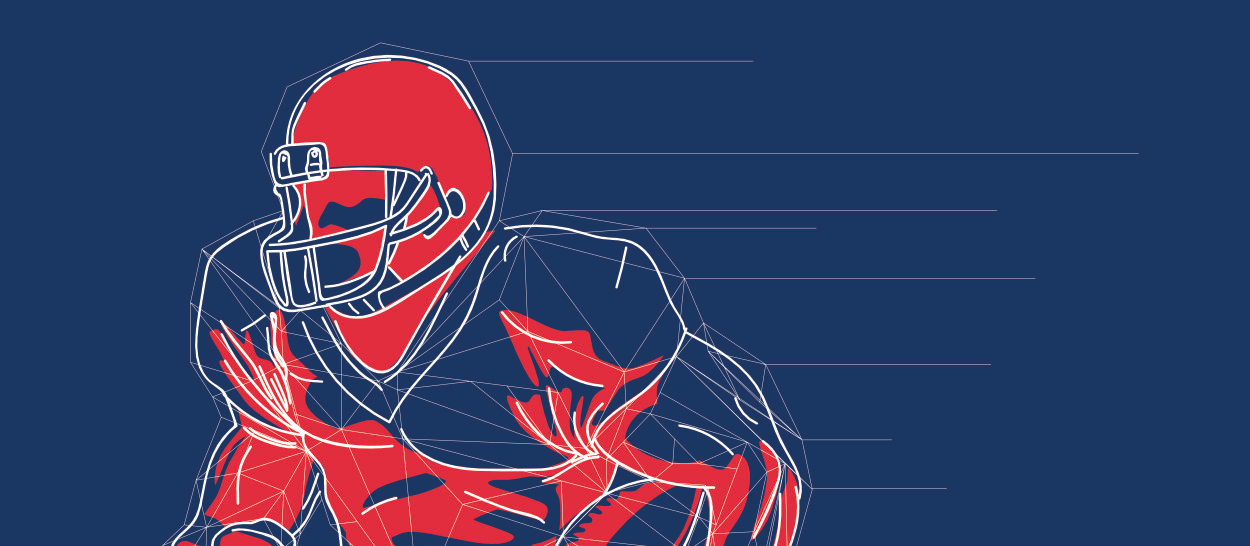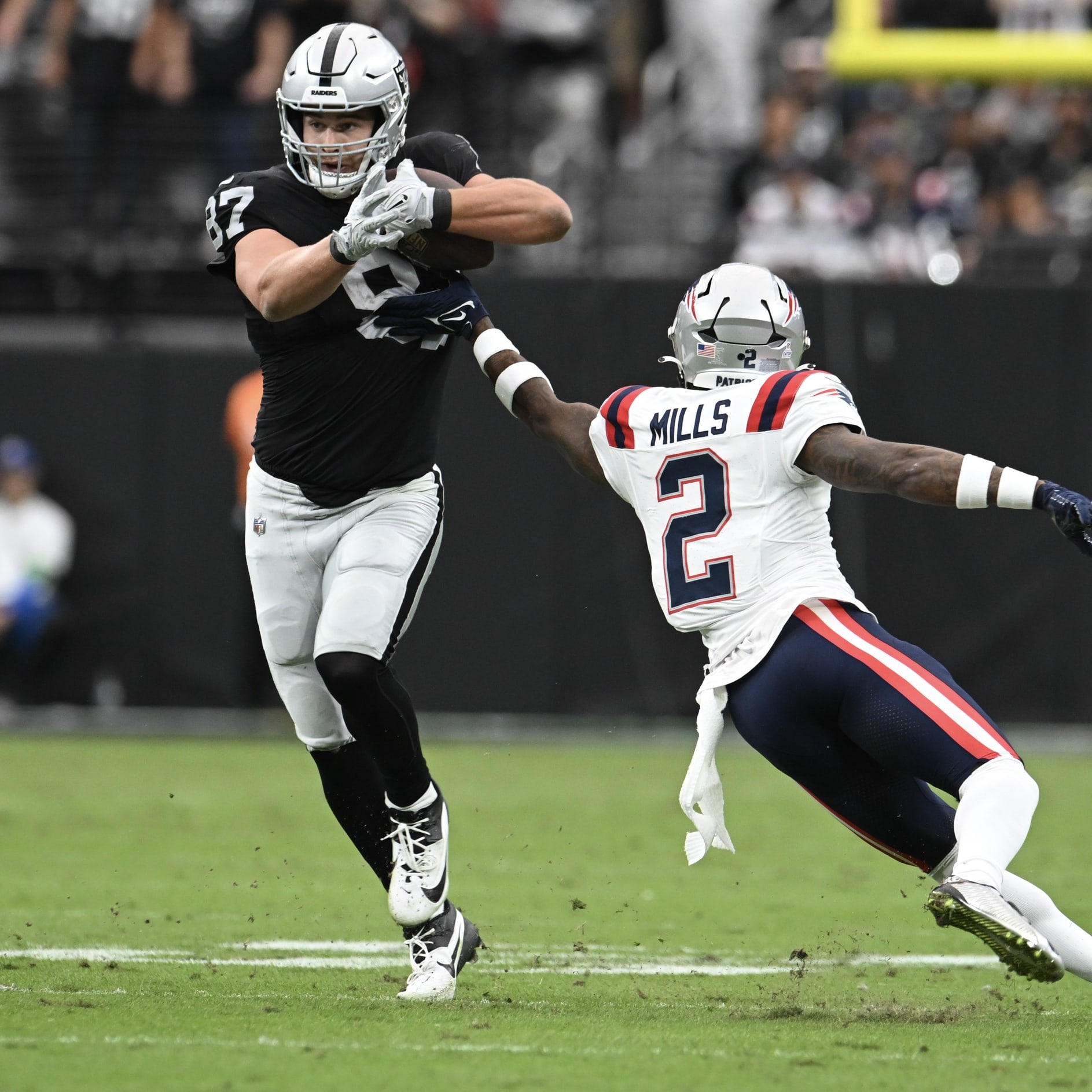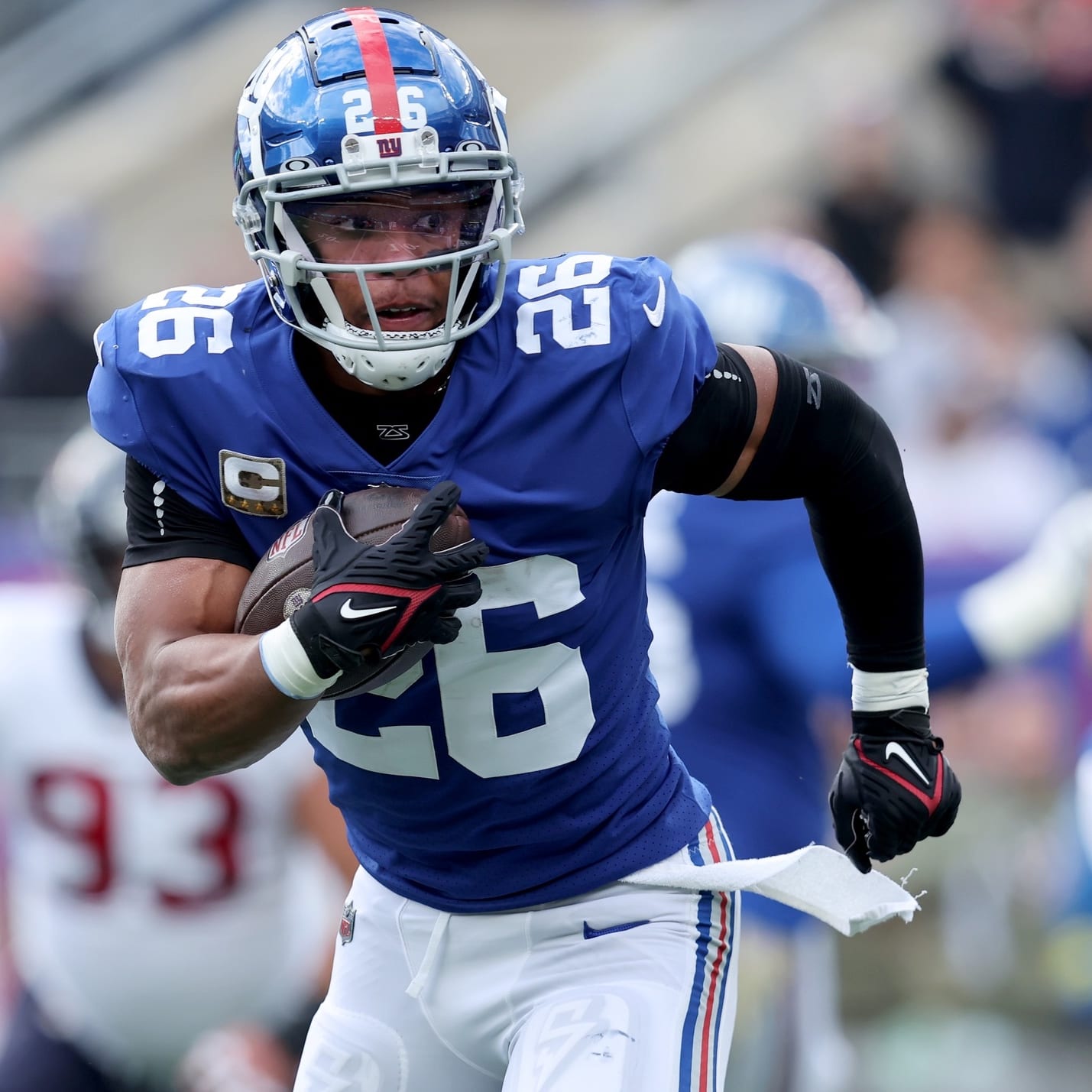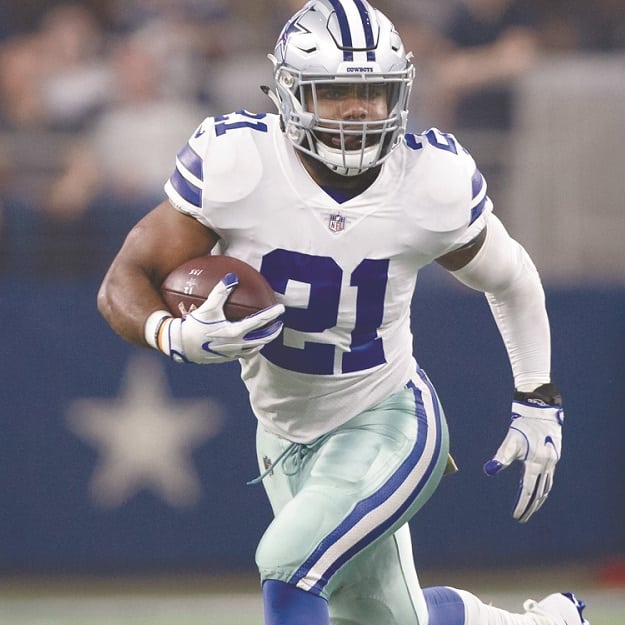This article is part of our East Coast Offense series.
Be Careful With Stats
We have to have some basis for lineup decisions, office-pools, survivor picks and, if you have my job, advice to other people, often in real-time. Much of the time, we rely on stats, as in: "Start Player X - he's had over 80 yards in five of the past six games against Opponent Y." That sounds reasonable, but it's worth asking a couple questions: (1) Do we have any historical data that shows that when a player has performed at a certain level against a particular team 5-of-6 times, that he's more likely to go 6-for-7 than 5-for-7? In other words, because someone's 5-for-6, that doesn't necessarily mean he has an 84 percent chance every time out; and (2) Because NFL teams only play each other twice per year at most, is data from three years ago relevant in any way? Even assuming 60 percent of Player X's supporting cast is the same, and 60 percent of Opponent Y's defense is the same, those players will have aged, accumulated injuries, might be used differently in the current scheme, etc. Once we scratch the surface a bit, the claim that we should elevate Player X over his normal rating because of his 5-for-6 against Opponent Y seems pretty flimsy.
Another way stats are misused is when we look at a lot of data under relatively persistent and stable conditions and conclude that it's applicable to our current situation. A good example is the notion that NFL underdogs
Be Careful With Stats
We have to have some basis for lineup decisions, office-pools, survivor picks and, if you have my job, advice to other people, often in real-time. Much of the time, we rely on stats, as in: "Start Player X - he's had over 80 yards in five of the past six games against Opponent Y." That sounds reasonable, but it's worth asking a couple questions: (1) Do we have any historical data that shows that when a player has performed at a certain level against a particular team 5-of-6 times, that he's more likely to go 6-for-7 than 5-for-7? In other words, because someone's 5-for-6, that doesn't necessarily mean he has an 84 percent chance every time out; and (2) Because NFL teams only play each other twice per year at most, is data from three years ago relevant in any way? Even assuming 60 percent of Player X's supporting cast is the same, and 60 percent of Opponent Y's defense is the same, those players will have aged, accumulated injuries, might be used differently in the current scheme, etc. Once we scratch the surface a bit, the claim that we should elevate Player X over his normal rating because of his 5-for-6 against Opponent Y seems pretty flimsy.
Another way stats are misused is when we look at a lot of data under relatively persistent and stable conditions and conclude that it's applicable to our current situation. A good example is the notion that NFL underdogs cover the point spread 51 percent of the time, so when in doubt, one should take the underdog. This is generally true and a lot more solid than starting Player X. But this year, underdogs have covered at a much higher rate (59 percent). So going forward, if I'm not sure about a game, should I be even more inclined to take the dog? It works historically, and it's worked even better this year. But when you consider why taking dogs has worked historically, the logic breaks down. Most people prefer to bet on what they take to be the better team, i.e., the favorite. (I'm not sure why this is, but my guess is people just want to align themselves with winners). Because Vegas knows this, they slant the lines ever-so-slightly in favor of the dog on average. As a result, slightly more underdogs cover. But if dogs are killing it this season (59 percent is major profits even after the vig), might the public start taking more dogs? And if that happens, Vegas might have to make its lines slightly more favorite friendly until this temporary tendency corrects.
The point is - most of what the stats show is only applicable under certain conditions, so you always want to keep a close eye on whether the relevant ones are changing.
The Probability Excuse
A few weeks ago, a reader got mad at me for telling him to sit Darren McFadden against the Broncos in Denver. If you recall, the Raiders were 8.5-point underdogs, the Raiders had scored nine points in San Francisco the prior week (while they scored 35 against San Diego the week before, only 19 of those were by the offense), McFadden had missed the prior game with a hamstring injury and said he was only 70/30 to suit up in a late game, and Michael Bush had been running effectively in his absence. Of course, McFadden not only started but had 196 total yards and four touchdowns. Was I wrong to suggest benching him? Of course not. Hamstring injuries are unpredictable, there was no word about his status before lineups needed to be set, and he was slated to split carries in a game which the O/U was around 40. (Meaning the Raiders were expected to score 16 points, some of which would likely be generated by Bush and some by the passing game). The odds of Oakland scoring 59 (a number that's only been met or exceeded 37 times in NFL history) were nearly zero. But you know all that.
I apologized to the reader and suggested he try out this site instead. (He did not find that funny, but because he was just a free-trial guy rather than a paid subscriber (and the tone of his criticism wasn't especially respectful), it was worth it). In any event, I use this example as one where the probabilities are relatively clear. That I was wrong based on the result doesn't make the advice bad because the result was so unlikely based on the available data at the time. So I have the "probability excuse" in this case.
But what happens when for example a certain web site predicts the 2007 Patriots will blow out the Giants and easily cover the spread? After the Giants win outright, they can point to the season-long data and say the odds of the Giants covering were less than 50 percent, and the odds of them winning outright were extremely slim. The Pats prediction was right in terms of the probabilities, but the variance in this one game made the result wrong. Just as while it's right to go all-in pre-flop with Aces against 2-7 off-suit, you might get unlucky when the flop comes 2-2-7. Only those with psychic powers can predict the variance on an individual flop or in an individual game. So no matter what actually happens, you've made the right call - as long as you got your money in with the best pre-flop hand.
But the NFL isn't like poker where the value of your holding never changes. Maybe you look down and see 2-7 offsuit, but then when you check again, you've got a pair of sevens. Maybe your aces have turned to A-5. If that happens, then your initial probability estimates were wrong. So it's not simply that you caught a bad beat, but you actually made a bad bet. The underlying conditions changed, and you didn't adjust your inputs accordingly. You used season-long data for the Giants and season-long data for the Pats when maybe only the teams' last four games mattered in that case.
So, I never want to become the guy that presumes every mistake I make is due to variance and never due to getting the odds wrong. More often than not, the "probability excuse" is a weak one when it comes to picking NFL games because unlike poker it's impossible to know if our initial inputs were right. And so results do matter. (Results over time are really what matter, but it's so hard to keep track of all the various fantasy predictions we make, it's easy to combine the "probability excuse" with hiding behind an impossible-to-calcuate track record). All that said, I stand by the McFadden recommendation. (I can't remember who the other player was, but it wasn't a scrub, and I think he went for 90 yards and TD that week).
Things to Take Away from Week 9
• Heading into the week, I was feeling hopeful about my teams again which are heavy on Beanie Wells, Steve Smith (CAR) and Ryan Mathews. Now not so much.
•Peyton Manning targeted Jacob Tamme 16 times Sunday. With Dallas Clark, Anthony Gonzalez and now Austin Collie likely out, that should continue. Tamme's a top-5 tight end going forward.
•Brett Favre threw for 402 yards against the Bears on December 5, 1993, but his career high of 446 yards was on Nov. 7, 2010.
• There's no reason to analyze the Chiefs running back usage except to say the overtime loss to the Raiders will very likely be the difference if Kansas City doesn't make the playoffs.
• The tight end attrition this year is truly epidemic - not only are Dallas Clark and Jermichael Finley out for the season, but two other top-five options Antonio Gates and Zach Miller missed last week's games and Vernon Davis left the week before. It makes you appreciate that Tony Gonzalez has only missed two games in his 14-year career. Considering the position he plays, that achievement in durability is arguably as impressive as Brett Favre's.
• The Giants are pretty good.
•Jacoby Ford ran a 4.28 40 at the NFL combine, the fastest time for a receiver since 2005. And It's not merely that he caught six balls for 148 yards in addition to returning a kick for a score, but how he did it. Ford made a couple spectacular plays and was the difference in the Raiders' biggest win in the last several years. Louis Murphy will be back after the bye, and Ford's only 5-9, but no Raiders receiver is particularly established. Ford should get a chance to show whether he's a key weapon over the next several weeks.
•Steve Johnson is 12th among receivers in yardage (554) and tied for sixth in touchdowns with six. Keep in mind his first couple games were with Trent Edwards at the helm, too. It's hard to rank him outside the top-20 the rest of the way.
• Even though the Seahawks have four wins, I'd argue Marshawn Lynch actually downgraded his supporting cast by going from Buffalo to Seattle.
•Terrell Owens has to be a top-10 receiver. He leads the NFL in targets and has seven touchdowns. Only Hakeem Nicks (9) and Calvin Johnson (8) have more.
• Even if Wes Welker qualifies at kicker now, he's not worth starting there in non-PPR leagues. After scoring three TDs in the first two games, Welker hasn't had one since.
• It's a travesty the Cowboys didn't give Wade Phillips more of a chance. As a Giants fan, I'd like to have seen what he could do over the next 5-10 years.
Things to Watch for in Week 10
• The Pats try to bounce back in Pittsburgh.
• After taking down the Saints and Pats, the Browns get their shot at the Jets.
• The Ravens, who beat the six-win Jets and Steelers, take on the six-win Falcons in Atlanta.
• The 49ers can get back into the NFC West race with a win over the Rams.
•Randy Moss' Titans debut against the Dolphins.
• The Jason Garrett era begins (probably rudely) in New York.
Beating the Book
Eagles -3 at Redskins
As a Giants fan, the Eagles are the NFC team that scares me most with Michael Vick playing so well, the speed and big-play ability at wide receiver and the aggressive, blitzing defense. But this is a bad setup for them, laying points in Washington who's coming off a bye on Monday night. Expect Donovan McNabb to play with extra focus against his former team (especially after last week's benching). Back the Redskins who win outright.
Redskins 24 - 23
We won with the Browns last week to go 6-3 in this forum and 60-65-5 on the season. We were 10-7 in this forum last season, 131-122 overall. We were 12-5 in this forum in 2008. From 1999-2009 we've gone 1439-1262 (53.3%, not including ties).
The full article comes out on Wednesday night.
Surviving Week 10
Last week I picked the Vikings here, but switched my pick to the Falcons in the full column, and neither win was pretty. I actually think the Vikings were the better pick given that the Cardinals needed special teams and defensive touchdowns to get to 24 points. But the Packers and Saints were clearly the stress-free choices, if that kind of thing matters to you.
For this week, there's one obvious pick, the Giants, but quite a few of you have probably used them already. The rest of the slate is pretty tough:
| Team | Opponent | Percent Taken |
| Bucs | Panthers | 55.0% |
| Giants | Cowboys | 27.8% |
| Colts | Bengals | 7.5% |
| 49ers | Rams | 3.2% |
| Jets | Browns | 1.6% |
| Eagles | Redskins | 1.6% |
| Cardinals | Seahawks | 1.3% |
| Other | N/A | 2.0% |
In my opinion, the Giants are a no brainer if you have them. Not only are they by far the biggest favorite, but only 27.8 percent of your pools are on them, probably because they've already been used up. After that, I'd take the Colts. The Bengals are not a doormat, but after losing in Philly, I think Indy will be tough to beat at home. If you've used both (as I have) good luck. The Bucs are the next most likely to win, but with so many other people on them, the payout is poor, and there's still risk there, even against Carolina. I think I'd take the 49ers at home for now. It's a huge risk, but remember, the goal is to win, not to back into the most friendly loss 12 weeks in. Of course, I reserve the right to change my mind when the full article comes out Thursday night.










